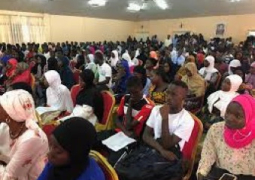
However, recently, it appears that their function and recognition, especially in today's generation, are fast fading away due to many reasons.
Alhajie Mbye is a renowned griot in the Greater Banjul Area, who serves as praise singer for most prominent politicians in the country.
For him, the respect that used to be accorded them is fast diminishing in this generation, something that is making the trade lose its value.
He expressed dismay with the low regard accorded to griots these days, acknowledging that the issue may be attributed to the attitude of some section of their members.
He observed that griots of today are to be blamed for such disrespect, noting that even as a custodian of society "you can’t just go to an event you're not invited to."
“I blame ourselves for the level of disrespect accorded to me and my fellows, because some people just walk to people's events without even being invited to.”
Griots, he added, have held quite a significant position in African culture most especially in local ceremonies.
"They serve as translators of historical facts and transfer moral issues by explaining the mystic world surrounding us and particularly past experiences."
However, some believe the fast depleting recognition of local griots is due to the fast changing nature of society; as communities become more divided about the need to have them in special occasions.
Mbaye suggested that if society paid adequate respect to the trade, children of griots would be excited to learn the trade.
"But for now, no one wants to be identified as a Griot. And that it is the same society that will suffer the consequences of a future without griots because they are losing a very fundamental thing of their life and world view."
Mariama Dampha, who celebrated her marriage ceremony two years ago, explained her decision why she didn’t invite griots to her well planned event.
“Way before I planned getting married, I always said to myself that I will not invite any griots to my wedding and I stick to that and my event went exactly as planned despite their absence.”
She further said griots nowadays use the trade as a form of begging instead of doing the real task.
“Griots of today don’t even do their job that is relating you to your past or even tell you about your history, but instead they throw money or a cloth at you just to have the money they are looking for without even knowing your name,” she added.
Houssoum Ceesay is a renowned historian that has written extensively on traditional Gambian societies.
For him, the image people have towards griots today is absolutely the direct opposite in view of their important status they had in the past.
“The presence of a griot in one’s ceremony used to qualify such an event as one that is of class, and every family sought for them in all important events.” he said.
The renowned historian acknowledged the functions of the griots, which he said, includes entertainment, mediation in family conflicts and custodians of family lineage.
This, he added, involved a lot of skills and effort, and therefore griots were supposed to only focus on how they do this important job while the patrons focus on the upkeep of the griots.
“Traditionally, the feeding and clothing of griots should be the sole responsibility of his patrons, however, the trade has become so profitable that everyone now ventures into it, mainly for economic reasons.” he stated.
He, however, believes that the reason why many young people have low regard towards griots is mainly because they are no more as skilled as they used to be and now some of them do not even sing, but rather just come and place money on you so they could be given something.
He said most of the efforts are now put on how to make money instead of learning the real history and the skills necessary to entertain their patrons.
Fatoumatta Suso, on the other hand, said regardless of how they are labeled. Griots played an important role in spicing up local events in communities.
“I can’t stop imagining how colourful griots will brighten my upcoming wedding ceremony in view of the fact I am from griots lineage.”
“I love their idea as my grandmother is a Griot and she still practices beautiful traditions. She sings for me and my siblings, which I always anticipate how her and her fellow griots will be praising me at my upcoming wedding to make it stand and one of the best.”




